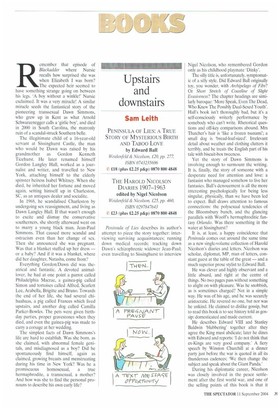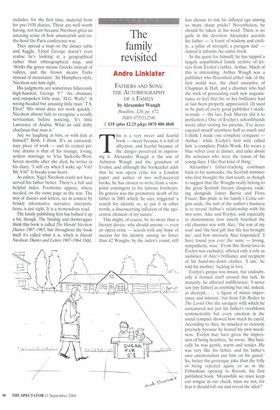Upstairs and downstairs
Sam Leith
PENINSULA OF LIES: A TRUE STORY OF MYSTERIOUS BIRTH AND TABOO LOVE by Edward Ball Weidenfeld & Nicolson, 420, pp. 277, ISBN 0743235606 118 (plus £2.25 p&p) 0870 800 4848 THE HAROLD NICOLSON DIARIES 1907-1963 edited by Nigel Nicolson Weidenfeld & Nicolson, .£25, pp. 460, ISBN 0297847643 (t. 123 (plus £2.25 p&p) 0870 SOO 4848 Remember that episode of Blackadder where Nursie recalls how surprised she was when Elizabeth I was born? The expected heir seemed to have something strange going on between his legs. 'A boy without a winkle!' Nursie exclaimed. It was a very miracle! A similar miracle seeds the fantastical story of the pioneering transsexual Dawn Simmons, who grew up in Kent as what Arnold Schwarzenegger calls a 'girlie boy', and died in 2000 in South Carolina, the matronly ruin of a scandal-struck Southern belle.
The illegitimate child of a 16-year-old servant at Sissinghurst Castle, the man who would be Dawn was raised by his grandmother as Gordon Kenneth Ticehurst. He later renamed himself Gordon Langley Hall, worked as a journalist and writer, and travelled to New York, attaching himself to the elderly spinster heiress Isabel Whitney. When she died, he inherited her fortune and moved again, setting himself up in Charleston, SC, as an antiques dealer and socialite.
In 1968, he scandalised Charleston by undergoing sex reassignment, and living as Dawn Langley Hall. If that wasn't enough to excite and dismay the conservative southerners, she shortly afterward went on to marry a young black man, Jean-Paul Simmons. That caused more scandal and ostracism even than her change of sex. Then she announced she was pregnant. Was that a blanket stuffed up her dress — or a baby? And if it was a blanket, where did her daughter. Natasha, come from?
Everything Gordon/Dawn did was theatrical and fantastic. A devoted animallover, he had at one point a parrot called Philadelphia Macrae, a guinea-pig called Simon and tortoises called Alfred, Scarlett Lee, Arabella, Brigitte and Bruno. Towards the end of her life, she had several chihuahuas, a pig called Frances which lived upstairs, and another dog called Camilla Parker-Bowles. The pets were given birthday parties, proper gravestones when they died, and even the guinea-pig was made to carry a corsage at her wedding.
The simplest facts of Dawn Simmons's life are hard to establish. Was she born, as she claimed, with abnormal female genitals, and misdiagnosed as a boy? Did he spontaneously find himself, again as claimed, growing breasts and menstruating during his time in New York? Was he a promiscuous homosexual, a true hermaphrodite, a transsexual, a mother? And how was she to find the personal pronouns to describe his own early life? Peninsula of Lies describes its author's attempt to piece the story together: interviewing surviving acquaintances; running down medical records: tracking down Dawn's schizophrenic widower Jean-Paul; even travelling to Sissinghurst to interview Nigel Nicolson, who remembered Gordon only as his childhood playmate `Dinky'.
The silly title is, unfortunately, symptomatic of a silly style. Did Edward Ball originally toy, you wonder, with Archipelago of Fibs? Or Short Stretch of Coastline of Slight Evasiveness? The chapter headings are similarly baroque: 'More Speak, Even The Dead, Who Knew The Possibly Dual-Sexed Youth'. Hall's book isn't thoroughly bad, but it's a self-consciously writerly performance by somebody who can't write. Rhetorical questions and off-key comparisons abound. Mrs Thatcher's hair is 'like a frozen tsunami'; a small dog is 'bread-loaf-sized'. Irrelevant detail about weather and clothing clutters it terribly, and he treats the English part of his tale with biscuit-box tweeness.
Yet the story of Dawn Simmons is involving enough to surmount the writing. It is, finally, the story of someone with a desperate need for attention and love: a fantasist who managed somehow to live her fantasies. Ball's denouement is all the more interesting psychologically for being less singular, physically, than we have been led to expect. Ball draws attention to famous connections: the polysexual tendencies of the Bloomsbury bunch, and the glancing parallels with Woolf's hermaphroditic fantasy Orlando. Was there something in the water at Sissinghurst?
It is, at least, a happy coincidence that Peninsula comes out around the same time as a new single-volume collection of Harold Nicolson's diaries and letters. Nicolson was scholar, diplomat, MP, man of letters, constant guest at the table of the great — and a much superior prose stylist to Edward Ball.
He was clever and highly observant and a little absurd, and right at the centre of things. No two pages pass without something to alight on with pleasure. Was he snobbish, as is sometimes charged? Not in a simple way. He was of his age, and he was securely aristocratic. He revered no one, but nor was he unkind. He claimed to dislike gossip, but to read this book is to see history told as gossip: domesticated and made current.
He describes Edward VIII and Stanley Baldwin `blubbering' together after they agree the King must abdicate; later he dines with Edward and reports: `I do not think that ex-Kings are very good company.' A fiery speech by Winston Churchill at a dinner party just before the war is quoted in all its thunderous cadences; 'We then change the subject and speak about the Giant Panda.'
During his diplomatic career, Nicolson was closely involved in the peace settlement after the first world war, and one of the selling points of this book is that it includes, for the first time, material from his pre-1930 diaries. These are well worth having, not least because Nicolson gives an amazing sense of how amateurish and onthe-hoof the Paris conference was.
They spread a map on the dinner table and haggle. Lloyd George doesn't even realise he's looking at a geographical rather than ethnographical map, and 'thinks the green means Greeks instead of valleys, and the brown means Turks instead of mountains'. Sir Humphrey-style, Nicolson sets him right.
His judgments are sometimes hilariously high-handed. George V? 'An obstinate and outspoken little man.' H.G. Wells? 'A wrong-headed but amusing little man.' T.S. Eliot? 'His mind does not work quickly.' Nicolson almost fails to recognise a scruffy serviceman, before noticing, It's little Lawrence of Arabia. What an odd shifty charlatan that man is.'
Are we laughing at him, or with him at himself? Both, I think. It's an extraordinary piece of work — and its central private drama is that of his strange, loving, sexless marriage to Vita Sackville-West. Seven months after she died, he writes in his diary, 'I still cry when I wake up. Viti! My Viti!' It breaks your heart.
As editor, Nigel Nicolson could not have served his father better. There's a full and helpful index. Footnotes appear, where needed, on the same page as the text. The mix of diaries and letters, set in context by briskly informative narrative interpolations, is just right. It is a tremendous read.
The family publishing firm has ballsed it up a bit, though. The binding and dustwrapper think this book is called The Harold Nicolson Diaries 1907-1963; but throughout the book itself it's called what it is, which is Harold Nicolson: Diaries and Letters 1907-1964. Odd.











































































 Previous page
Previous page